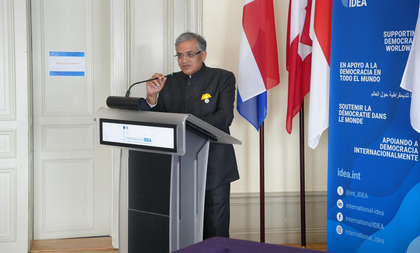CEC Gyanesh Kumar spotlights India's electoral integrity and scale at Stockholm conference
By IANS | Updated: June 11, 2025 14:13 IST2025-06-11T14:07:30+5:302025-06-11T14:13:33+5:30
Stockholm, June 11 Chief Election Commissioner (CEC) of India, Gyanesh Kumar, delivered the keynote address at the Stockholm ...

CEC Gyanesh Kumar spotlights India's electoral integrity and scale at Stockholm conference
Stockholm, June 11 Chief Election Commissioner (CEC) of India, Gyanesh Kumar, delivered the keynote address at the Stockholm International Conference on Electoral Integrity on Tuesday, showcasing India's unparalleled electoral scale, diversity, and commitment to democratic values.
Speaking at the global forum hosted by the International Institute for Democracy and Electoral Assistance (International IDEA), Kumar reaffirmed the Election Commission of India’s (ECI) dedication to conducting elections with integrity and supporting global capacity-building initiatives for Election Management Bodies (EMBs).
The conference was attended by over 100 participants representing EMBs from nearly 50 countries.
“Conducting elections with utmost integrity is a testament to our national resolve,” he stated, underlining the ECI’s global leadership in electoral practices.
Highlighting the sheer magnitude of India's democratic exercise, Kumar noted that India’s elections are conducted under the scrutiny of political parties, candidates, observers, media, and law enforcement -- ensuring transparency akin to concurrent audits at every stage.
During general elections, the ECI mobilizes over 20 million personnel, including polling staff, police, observers, and political agents -- making it the world’s largest election management operation, he said.
Tracing the evolution of India’s electoral process, Kumar emphasised the Commission’s ability to adapt to growing complexities while remaining rooted in constitutional values.
“From 173 million electors in 1951-52 to 979 million in 2024, and from just 0.2 million polling stations in the early years to over 1.05 million today, India's electoral journey has demonstrated institutional foresight and unmatched scale,” he said.
He said the 2024 General Elections featured 743 political parties -- comprising six national and 67 state parties -- and over 20,000 candidates, with the process facilitated by 6.2 million Electronic Voting Machines (EVMs).
Gyanesh Kumar described it as a reaffirmation of the ECI's capability to deliver inclusive, efficient, and secure elections.
He also highlighted India's rigorous approach to maintaining the electoral roll, which has been shared annually with all recognized political parties since 1960 -- allowing for claims, objections, and appeals. This statutory provision, he noted, stands as one of the most transparent and robust voter list management systems in the world.
Kumar further underscored the inclusivity of India’s elections -- from first-time voters to senior citizens above 85 years, persons with disabilities, third-gender electors, and those in remote or high-altitude areas like Tashigang in Himachal Pradesh.
He stressed that "leaving no voter behind" is a constitutional commitment, not merely a logistical goal.
On the sidelines of the conference, the CEC held bilateral meetings with his counterparts from countries including Mexico, Indonesia, Mongolia, South Africa, Switzerland, Moldova, Lithuania, Mauritius, Germany, Croatia, Ukraine, and the United Kingdom.
These discussions focused on themes such as voter participation, electoral technologies, diaspora voting, and institutional collaboration.
Disclaimer: This post has been auto-published from an agency feed without any modifications to the text and has not been reviewed by an editor
Open in app